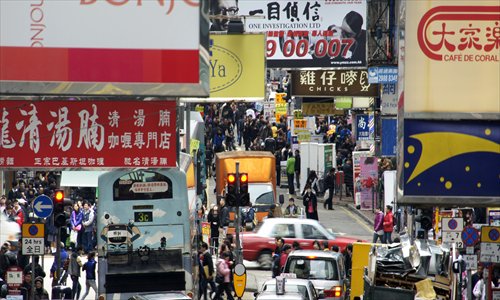HOME >> CHINA
TV station criticized by HK residents for using simplified Chinese
By Jiang Jie Source:Global Times Published: 2016-2-29 19:53:02

Pedestrians walk on a busy Hong Kong street in 2012. Photo: CFP
Hong Kong residents' debate over the use of simplified Chinese characters in the region's TV programs has renewed concerns about localism and even "Hong Kong independence," amid the city's increasingly volatile political atmosphere.
TVB, Hong Kong's largest TV station, on February 22 started broadcasting its Putonghua news bulletin on HD Jade Channel, which was renamed J5. J5 used simplified Chinese characters in its broadcast, triggering criticism from some viewers as the region usually uses traditional characters.
As of 5 pm on February 23, the local communications authority received nearly 10,000 complaints about the usage of simplified Chinese characters on J5, the Hong Kong-based South China Morning Post reported.
"Cantonese and traditional characters are part of Hong Kong's traditional culture. Hong Kong people are proud of inheriting traditional Chinese characters from ancient culture. We refuse to use Putonghua and simplified Chinese that do not belong to Hong Kong traditions," a netizen named Caspar Pong Luk commented on TVB's Facebook account.
Some comments on Facebook joked that TVB had turned into China Central Television - the main State-owned TV station in the Chinese mainland.
Under the terms of its license, the TV station is required to provide Chinese subtitles for its newscasts, weather forecasts and current affairs programs, and TVB is allowed to decide how the subtitles were presented, a spokesperson from the communications authority was quoted as saying.
In a February 23 statement, TVB said that the new arrangement would offer viewers more choices and better serve audience needs and that "Hong Kong is an international city."
While a similar debate on Chinese characters previously broke out in South China's Guangdong Province where traditional characters are also often used, the controversy in Hong Kong, which neighbors Guangdong, has been more widespread and of greater intensity.
Word warriors
This is reportedly the third controversy over the use of simplified or traditional Chinese characters in Hong Kong this year.
Character criticism was also aimed at British singer and fashion designer Victoria Beckham when she used simplified characters to promote her new store in Hong Kong via her Instagram account on February 14.
The post was soon bombarded with criticism from Hong Kong Net users, who accused her of being "disrespectful," which then led to a retraction of Beckham's message and a new post using both traditional and simplified Chinese characters.
Also in February, Hong Kong education authorities suggested schools teach simplified Chinese to enhance exchanges with the mainland. Members of Hong Kong's Neo Democrats party protested against the decision in front of the city's education bureau.
'Radical and absurd'
"Some criticisms are based on a mindset that the usage of simplified characters in Hong Kong is an implementation of Beijing's decision, which is not based on reality," Ho Leong-leong, a commentator with Hong Kong-based Phoenix TV, told the Global Times.
According to Ho, simplified characters are increasingly being used in the region, especially since 1997, but the change is driven by the needs of local residents, as exhanges between Hong Kong and the mainland are increasing.
"It is a deliberate political interpretation by some 'Hong Kong independence' forces," Ho said, adding that while the region is generally stable, there are "radical and absurd" sentiments among some young people that want to cut ties with the mainland.
Localist sentiment has been prevalent since June 2015 when reform of the system for electing the region's chief executive was vetoed by the Legislative Council, said Zhu Shihai, a scholar specializing in Hong Kong at the Macao University of Science and Technology, adding that better mainland-Hong Kong affairs ties could reduce this trend.
Hong Kong has been increasingly volatile in recent years, following the 2014 Occupy Central protests over electoral reform and 2015 rallies targeting mainlanders that flood the city to buy products to resell. A slowing economy and the widening gap between rich and poor may be partially to blame for many of these disturbances, experts said.
Newspaper headline: Character assassination
Posted in: Society